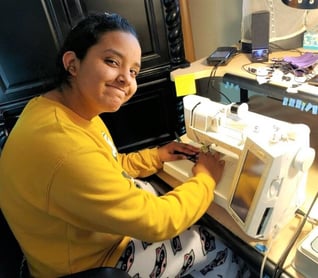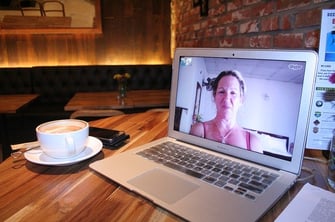Each fall, I welcome a new group of exchange students to the Oregon coast and watch them begin the process of adapting to their new normal, which is far from what they are used to--both geographically and culturally. Eager students step off the plane expecting to adapt to things like a new language, unfamiliar food, and a family of strangers, but they are often caught off guard by the plethora of unforeseen differences they face. Rules, customs, habits, and routines within their host family differ, and even contradict, their long-held norms, and reorienting their understanding of normal is challenging, if not overwhelming. These students knew from the start that their exchange experiences would require flexibility and a willingness to adapt, but most exchange students are surprised at just how hard that process actually is.
 Often, frustration grows, not because the individual changes are particularly hard, but because living daily life in an entirely new way, day in and day out, is simply exhausting. As time goes on, there is a longing to return to doing things the way I’m used to, the normal way. Each small cultural difference can be like the drip, drip, drip of a leaky faucet that gets more irritating and draining with each passing day. We call this Culture Shock, and we work hard to prepare students for it and guide them through it.
Often, frustration grows, not because the individual changes are particularly hard, but because living daily life in an entirely new way, day in and day out, is simply exhausting. As time goes on, there is a longing to return to doing things the way I’m used to, the normal way. Each small cultural difference can be like the drip, drip, drip of a leaky faucet that gets more irritating and draining with each passing day. We call this Culture Shock, and we work hard to prepare students for it and guide them through it.
Many of us are experiencing a culture shock of our own as we try to adapt to a time of social distancing that has been placed upon us. We are learning to work, shop, and socialize in ways that are completely different from what we are used to. Some of the changes are truly hard, but others are hard simply because we’re tired, ready for this to end and for things to get back to normal.
As I pondered this parallel, I realized that much of the advice I give my exchange students as they go through culture shock can help us survive and thrive as we go through this challenging time. So here are some tips:
 Focus on the positive. Yes, there’s much happening that's sad and even scary. However, this crisis is also bringing out the best in many people. Old friends are reconnecting, families are growing closer, and society is rallying to protect the elderly. Look for the good that is happening around you. I often tell exchange students to make a list of the best part of each day, post it in their room, and read it daily. It’s amazing what a difference changing your focus can make.
Focus on the positive. Yes, there’s much happening that's sad and even scary. However, this crisis is also bringing out the best in many people. Old friends are reconnecting, families are growing closer, and society is rallying to protect the elderly. Look for the good that is happening around you. I often tell exchange students to make a list of the best part of each day, post it in their room, and read it daily. It’s amazing what a difference changing your focus can make.
Stay busy. This is my #1 tip for exchange students struggling with culture shock. Empty hours often lead to a focus on and longing for the things we can't have. Avoid letting your mind cycle through all the what-ifs. Staying busy will probably look different than it used to, and it may take some creativity. But filling your hours with activity makes your days more productive and improves your emotional health. Clean out a closet, call a friend, read a book, or teach the dog a new trick.
 Exercise. This works for exchange students and it will work for us too. Choose a way to get that blood pumping, even for just a few minutes each day. Physical activity will chase away the blahs, release endorphins, and reduce stress. If you can’t get outside, find an online video to help you walk, dance, do yoga, or engage in whatever activity makes you smile. Not only will it help your mood today, but you just might come out of this a little lighter and fitter than before!
Exercise. This works for exchange students and it will work for us too. Choose a way to get that blood pumping, even for just a few minutes each day. Physical activity will chase away the blahs, release endorphins, and reduce stress. If you can’t get outside, find an online video to help you walk, dance, do yoga, or engage in whatever activity makes you smile. Not only will it help your mood today, but you just might come out of this a little lighter and fitter than before!
Try something new. Exchange students often discover that the activity they are so passionate about at home is either unavailable or simply not popular in their host community, so they must try something new. Often, this new activity turns out to be one of the best memories of their exchange.  A dozen years ago, Hirun from Thailand implemented this principle and started cooking for his host family in Oregon, though he had never cooked before. He found such joy in cooking that he continued to pursue it as a career when he returned to Thailand, and eventually became an acclaimed chef who has served ambassadors and appeared on Iron Chef Thailand!
A dozen years ago, Hirun from Thailand implemented this principle and started cooking for his host family in Oregon, though he had never cooked before. He found such joy in cooking that he continued to pursue it as a career when he returned to Thailand, and eventually became an acclaimed chef who has served ambassadors and appeared on Iron Chef Thailand!
If some of your regular hobbies are on hold, this may be the ideal time to try out something you've never done before. Many colleges and organizations are offering free or reduced-fee online classes, so now’s a great opportunity to learn something new.
Connect with others. At the end of each year, I ask my exchange students to write out advice for the next year’s group. Every year, the top piece of advice is Join a fall sports team. Seem odd? It isn’t. Exchange students start school knowing no one, and becoming part of a team is the quickest and easiest way for them to start building friendships that will carry through the year.
 Right now, we are restricted from hanging out with people who don’t live in our home. But we can still connect, and it’s important that we do! Call your friends. Facetime your family. Offer a friendly wave to people who drive by your house. The effort you put into connecting with others will pay off. Connection makes our good times better and our tough times a little easier.
Right now, we are restricted from hanging out with people who don’t live in our home. But we can still connect, and it’s important that we do! Call your friends. Facetime your family. Offer a friendly wave to people who drive by your house. The effort you put into connecting with others will pay off. Connection makes our good times better and our tough times a little easier.
Be patient. Culture shock is often intense for exchange students, and there’s a tendency to feel like it will never end. But it will. As I watch each year's group of students go through the culture shock cycle, I offer lots of encouragement to keep doing the right things and have confidence that things will soon be better and easier.
We are in a hard season, no doubt about it. But this season won’t last forever. The time will come when we can again go to the movies, host a barbeque, or walk down a crowded city sidewalk. In the meantime, take a deep breath and remind yourself that today’s social distancing is temporary.
 Look to the future. Most of us have a little extra time on our hands right now, which makes this an excellent time to dream! What is your ambition for when things return to normal? Is there anything you can do now to move toward that goal? Last night, my husband and I spent some time reading profiles of exchange students we might like to host this fall. Hosting has been a huge part of our family life, and selecting a student now is a concrete, hopeful step toward a bright future.
Look to the future. Most of us have a little extra time on our hands right now, which makes this an excellent time to dream! What is your ambition for when things return to normal? Is there anything you can do now to move toward that goal? Last night, my husband and I spent some time reading profiles of exchange students we might like to host this fall. Hosting has been a huge part of our family life, and selecting a student now is a concrete, hopeful step toward a bright future.
We may not have control over our circumstances, but we are wrong to say we have no control at all. Just as thriving exchange students learn to see the beauty of the unfamiliar, we too can thrive in a world that seems to be moving in slow motion. There is real hardship and real sorrow, but we would be remiss to ignore the fact that there can also be real joy and lasting growth.


